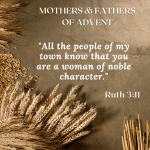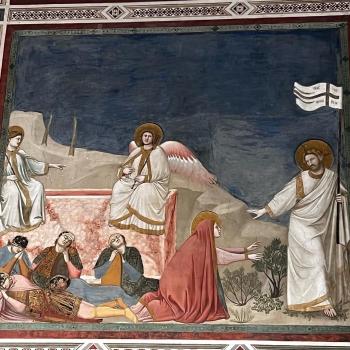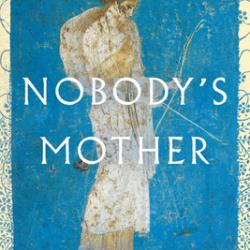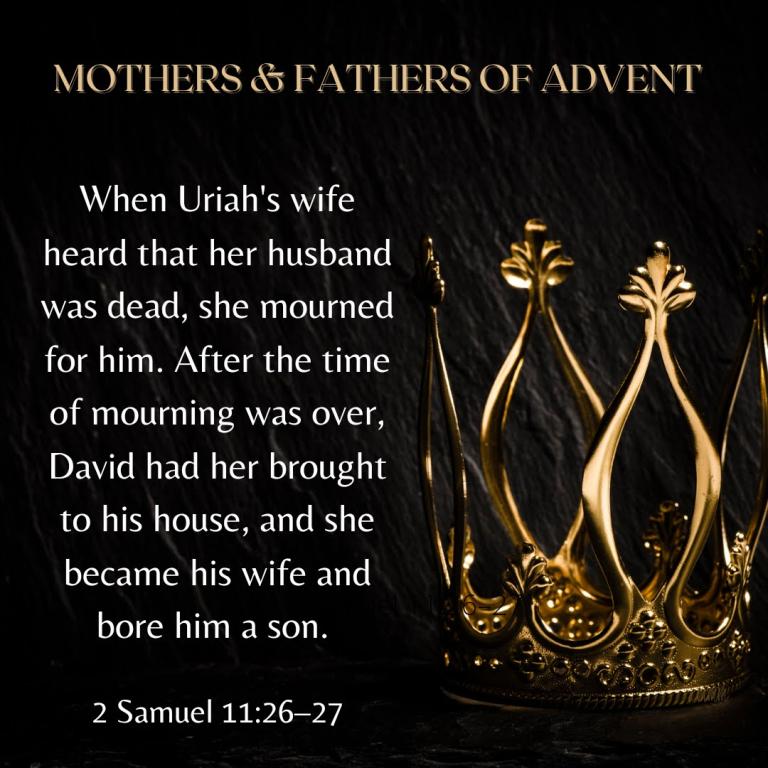
The fourth of five posts in a series exploring the stories of the women, and their men, included in Jesus’s genealogy.
Most folks know the story of David and Bathsheba. It’s sordid, even by biblical standards, and especially cringe-worthy for the chosen king of God’s chosen people. But there she is, mentioned in the sixth verse of the New Testament. Why on earth would the Gospel-writer—chronicling the life of Jesus of Nazareth to show he was the rightful king of Israel, the promised Messiah—include the name of the woman who brought down the greatest king in their national history? What does their story teach us about God?
Catching Up
Matthew 1:6— “. . . David was the father of Solomon, whose mother had been Uriah’s wife . . .”
The story in question happens in 2 Samuel 11–12. David is at the apex of his reign, having subjugated enemies within and without his kingdom. In 11:1, the story opens with David sending his general and army off to war but not going with them. Instead, he takes a siesta and relaxes with a stroll on his palace roof, above the city, from which he spies a lovely woman bathing. He inquires about her, then sends messengers to escort her to him. He sleeps with her, sends her home, and that’s it—until she sends word that she is pregnant.
News that his indiscretion could be exposed causes David to bring the woman’s soldier husband home and attempt to lure him to her bed to confuse the paternity of her child—to pass his baby off as the husband’s. But the soldier is devoted and upright, and he refuses to visit his wife. So David sends him back to his general with his own death warrant, orders for a military strategy that will get him killed. When news comes that his plot was successful, David marries the man’s widow. But God is not mocked, and he sends his prophet to show David the error of his ways. David repents, but harsh consequences follow him the rest of his days.
Bathsheba’s Role
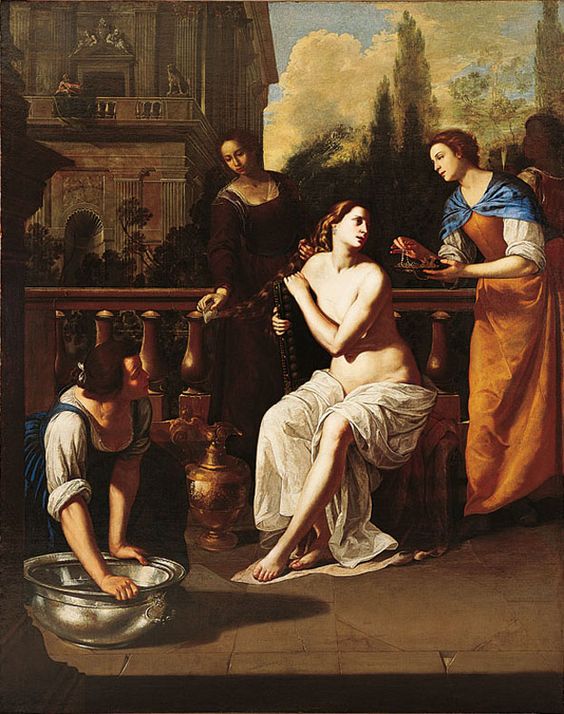
How complicit was Bathsheba in this scenario?
Artists and theologians through the ages have pictured her as a seductress at worst and a willing partner at best. Why else would she be bathing, perhaps nude, in public—where she knew the king could see her?
Israelite culture gives us several clues regarding Bathsheba’s situation.
First, since no Israelite house had running water at that time, bathing often would have been performed privately, perhaps in the enclosed courtyard that was a part of many Israelite houses. 2 Sam. 11:4 says that from his rooftop David saw a woman bathing. It does not say if she was clothed or naked, so we must go to our knowledge of the culture to clarify what might have happened. Seminary professor Dr. Lynn Cohick describes the scene: “In a city known for its scarcity of water, she was using a jug, not a jaccuzi.”
There is no indication in the text that the woman deliberately positioned herself so as to entice David. But we know that David looked, and looked again, which violated privacy customs. Much as if we accidentally walked into the restroom of the opposite sex, we’d avert our eyes, turn around, and back away so as to minimize the other’s embarrassment, so was the expectation that if anyone were accidentally witnessed bathing, the bystander would turn the other way.
While Bathsheba did not entice David with her bath, he did pursue her. He sent someone to discover her identity. Oddly, the knowledge that her husband and father were among his thirty mighty men (2 Sam 23:13, 34, 39), and that her grandfather was his personal counselor (2 Sam 15:12) did not sway him from his covetousness. He sent “messengers” (plural!) to bring her to the palace. David is consistently portrayed as the acting agent in the story. Everything happens because he makes it happen.
Can we call their liaison adultery? Only in the strictest sense, and if we also label David’s liaisons with all his wives and concubines in the same way. I’ve never seen those relationships described as adulterous. Bathsheba doesn’t fit that label either. It implies mutuality between the two.
David’s behavior constitutes a gross abuse of power.
He used his position, authority, and resources to take advantage of Bathsheba, whose husband and father (two closest relatives of authority and protection) were off fighting David’s war. In today’s parlance, his actions are known as “power rape”:
“Consent cannot be given by individuals who are underage, intoxicated or incapacitated by drugs or alcohol, or asleep or unconscious. … Unequal power dynamics, such as engaging in sexual activity with an employee or student, also mean that consent cannot be freely given.”— RAINN
To label King David as a rapist and/or abuser evokes a variety of reactions. Evangelicals have long been taught about his impressive resumé, his description as a man “after God’s own heart,” that balances out his weakness for a beautiful woman. But Scripture itself condemns David alone for his egregious actions toward Bathsheba and Uriah. 2 Sam 11:27 states, “The thing that David did displeased the Lord” (NIV) / “But what David had done was evil in the Lord’s eyes” (CEB).
In chapter 12 the narrator confirms his conclusion with Nathan’s parable of a greedy landowner who stole a poor man’s precious ewe. David, not realizing it was a parable, was outraged, declaring that the landowner must die for his cruel action.
David convicted himself.
“You are the man!” replied Nathan (12:7a).
He continued, “This is what the Lord, the God of Israel says: I anointed you king over Israel, and I delivered you from the hand of Saul. I gave your master’s house to you and your master’s wives into your arms. I gave you the house of Israel and the house of Judah. And if all this had been too little, I would have given you even more. Why did you despise the word of the Lord by doing what is evil in his eyes?” (12:7b–10).
In sinning against Bathsheba and Uriah, David sinned against God.
David’s Legacy
Though this post isn’t meant to feature David fully, a little context will help us understand him better. He was the golden child who grew into a Renaissance man before there was a Renaissance: witness his artistic (music/psalm-writing) abilities and his prowess as a warrior/athlete. He was chosen by God, anointed king over Israel, favored by God to avoid Saul’s attacks, and eventually reigned over all Israel and defeated their enemies. Under his rule, the nation and its boundaries were established.
God made an everlasting covenant with him: that he would always have a descendant on the throne (2 Sam 7:11–16). That promise was made before David stole a man’s wife and then had him murdered to cover it up. David was called “a man after God’s own heart” (1 Sam 13:14), even by New Testament writers (Acts 13:22). How can a man described like that make such terrible, selfish, destructive choices?
Repentance
Upon Nathan’s declaration of his guilt, David immediately repented. It’s as if the parable of the ewe lamb opened his eyes to how God viewed Bathsheba and what awful evil he had perpetrated upon her. Psalm 51 chronicles David’s lament and confession. He truly repented. No shifting of blame, no excuses. (This is what makes him a man “after God’s own heart” despite awful sins like this).
Consequences
The rest of David’s reign was plagued by trials and failures both political and personal. He suffered consequences despite his sincere remorse and repentance. The most immediate price? The life of his and Bathsheba’s newborn son. Despite a week of fasting a praying, David had to face the news that his son was dead. It’s a hard truth that sometimes the innocent suffer from another’ sin.
Violence, which David had used indirectly to murder Uriah, would define David’s household in years to come (2 Sam. 12:10; 13:23–33).
Open sexual immorality would also plague David’s household (i.e., just as David had secretly violated another man’s wife, so his wives would one day be violated openly by “one who is close to you” —2 Sam. 12: 11–12; 13:1–21; 16:20–23).
Being forgiven does not always mean restoration, peace, resumption of a normal life. David did experience forgiveness and mercy, as Nathan told him, “the Lord has taken away your sin; you will not die” (12:13). And he remained king. But the cracks in his dynasty began spreading immediately.
God’s Character Revealed
What does the story of David and Bathsheba teach us about God?
Most notable, I think, is God’s immediate forgiveness offered to a repentant David. Even two of society’s greatest offenses, murder and sexual abuse, do not take a person so far that God cannot redeem him (or her). As God forgave David, so he will do for us.
Grace: Not only did David avoid the death penalty (Leviticus 20:10), he retained both his life and his throne. He and Bathsheba had four more sons together, and their oldest surviving son, Solomon, eventually succeeded David. “But where sin increased, grace increased all the more” (Romans 5:20).
There is goodness and mercy for all of us who have stumbled morally, no matter who we are or what our position, if we will trust in the grace (unmerited favor) of the Great Shepherd of our souls. Our hope lies in Jesus’s sacrifice on the cross and resurrection from the dead.
He restores the broken: We should wrestle with the troubling reality that Bathsheba suffered through the death of her baby because of David’s sin. She married her first husband’s murderer. David caused her great trauma, yet God was able to heal her. Bathsheba went from a violated, pregnant one-night stand to a queen, then to queen mother (of Solomon) with influence and respect. She helped ensure Solomon inherited David’s throne, and she sat at her son’s right side as a valued counselor.
Faithfulness: Remember that a few chapters before the Bathsheba story, God had promised David an eternal kingdom. Because he is true to himself, the very standard of faithfulness, God did not back out of his agreement with David. Through the clay-footed David, God determined to bring forth a dynasty of leaders. The rest of the Old Testament shows that none of them fared any better than David. But the covenant did not depend on their behavior—God’s word stands forever. Jesus, the Messiah, the culmination of the Davidic line, would be that perfect King, the true reflection of God’s heart.
To explore the stories of the three mothers—Tamar, Rahab, and Ruth—listed prior to Bathsheba’s name, click the links to my posts below.
The Moral Dilemmas of Judah and Tamar
A Woman (and Man) of Noble Character: Ruth and Boaz in Jesus’s Genealogy

